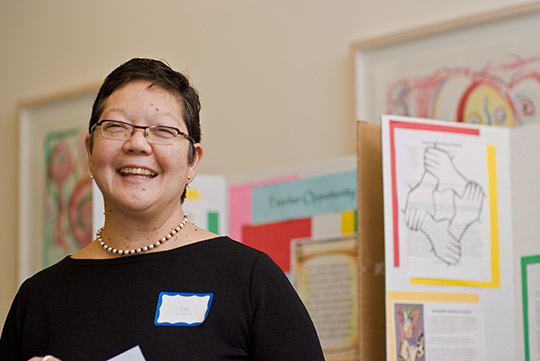TR@TC2: A $7.5 Million Residency Program Emphasizes Teaching Students, Not Just Subjects
“The education profession is recognizing that content alone is not adequate – that we need to think about accessibility and diverse learners,” says A. Lin Goodwin, Vice Dean and Evenden Professor of Education. “What does it mean to teach science at the secondary school level to kids who don’t speak English as a first language, or who have educations that have been interrupted by war? How do we teach the person, not the subject?”
One answer is Teaching Residents at Teachers College 2 (TR@TC2), the new 18-month teaching residency being launched by Goodwin that will prepare diverse, highly qualified teachers of English as a Second Language, Students with Disabilities, Science-Biology and General Science, and Science-Students with Disabilities. Residents in the program, which is funded by a $7.5 million Teacher Quality Partnership (TQP) federal grant, will do their fieldwork with a consortium of New York City public schools, reflecting the U.S. Department of Education’s focus on building partnerships between universities and high-need school districts.
TC is among 24 teacher preparation programs nationwide funded by the TQP grants to prepare more than 11,000 teachers, with a national goal of improving student achievement in the STEM disciplines.
TR@TC2 will employ an approach called Universal Design for Learning and Curriculum Development, which holds that, just as a building should be accessible to all, so should educators create a pathway to understanding for each and every learner.
Residents in the program’s science education track will benefit from the College’s partnership with the American Museum of Natural History, led by Maritza MacDonald (Ed.D.’95), Senior Director of Education and Policy, which also received a TQP grant.
“We’ll use the museum partnership to build our pre-service students’ science literacy, particularly in earth science,” Goodwin says. “Meanwhile we bring the expertise in areas such as special and inclusive education, and in induction support for novice teachers. So it’s a marriage of specialization and content that stresses a model of educators and scientists co-planning and co-teaching.”
In math, TR@TC2 will draw on the College’s alliance with Singapore’s National Institute of Education (also forged by Goodwin), employing the “Singapore math” approach of focusing in-depth, over longer periods of time, on fundamental concepts. And in engineering and technology, the program will tap partners at Barnard who integrate engineering principles into course such as “Science in the (New York) City” and the Teachers College Inclusive Classrooms Project with a particular focus on assistive technology to support students with disabilities.
The TR@TC2 residents will also apprentice with a group of experienced mentor teachers at the participating local schools.
“The demands we place on our mentor teachers are way beyond those of other programs,” Goodwin says. “They undergo three days of training, orientation and professional development before school starts. They attend monthly learning community meetings, two full-day retreats and an end-of-year evaluation and celebration. Plus all the other reports and assessments we ask of them.”
TR@TC2 extends the foundation established by TR@TC, the teaching residency program Goodwin started in 2009, which has graduated four cohorts of teachers who serve in New York City schools. TR@TC residents were prepared to work either secondary inclusive education, intellectual disability/autism, or the teaching of English to speakers of other languages (TESOL).
Published Thursday, Oct. 30, 2014
